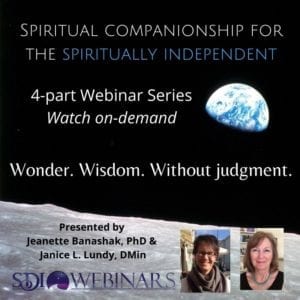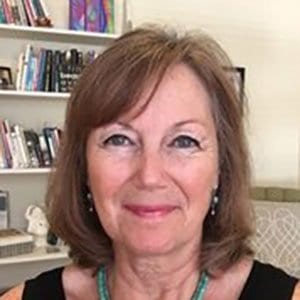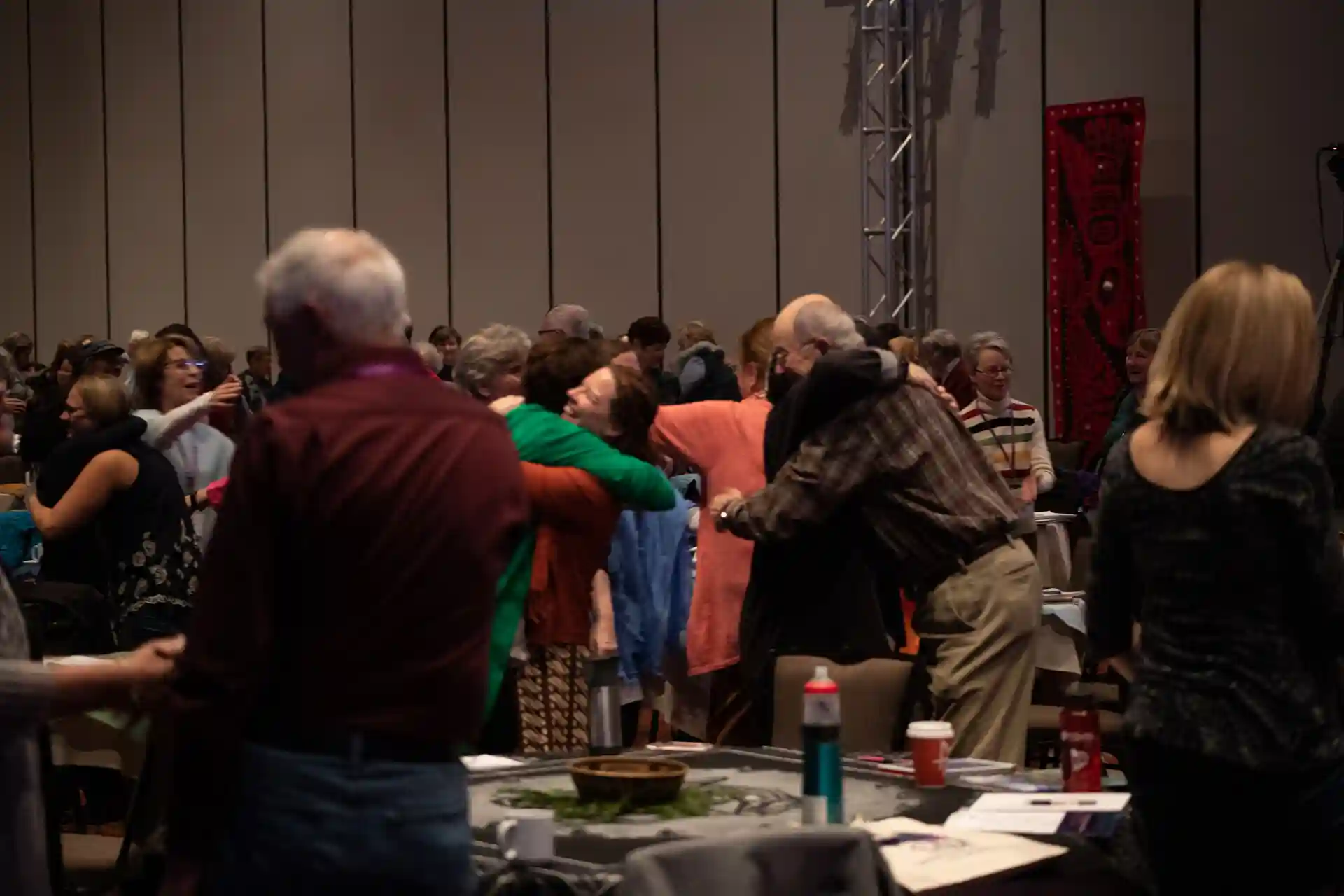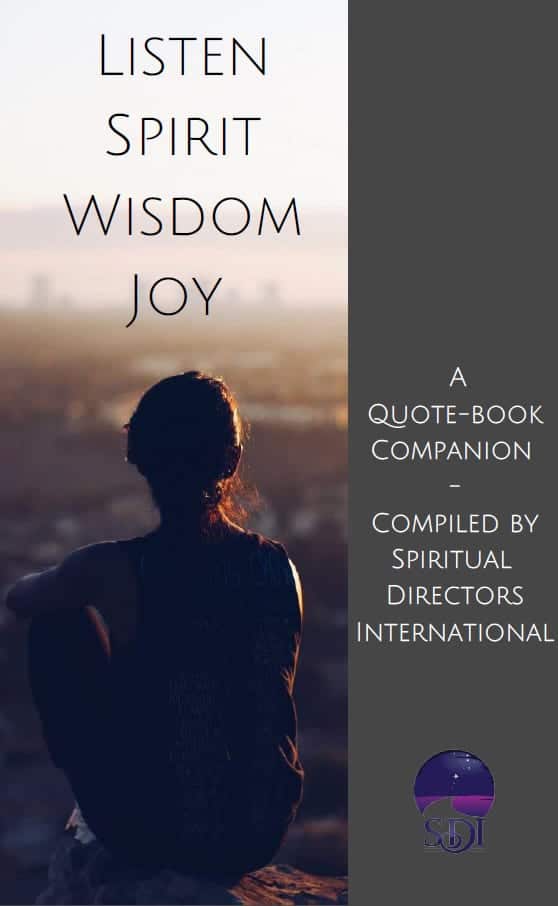Editor’s note: Jan Lundy and Jeanette Banashak are the presenters of our 4-part webinar series “Spiritual Companionship for the Spiritually Independent.” Here, Jan outlines her own journey to spiritual independence.
In recent years, I have come to claim myself as a “spiritually independent” person, not by birth, but by choice; someone who has followed her own “yellow brick road” to the divine. This has not been an easy path to walk especially when you’ve been raised and work in a conservatively Christian part of the world. Upon first meeting, a common query from people in my area is “Which church do you go to?”, for one is often identified by church or parish.
In the past when this question was asked, I’d predictably dodge it by saying, “I’m more of an ecumenical type person,” which would leave them nodding but confused. Because my spiritual life became eclectic and did not follow the unspoken “rules of belonging,” I took to hiding it; practicing and believing in a spiritual closet of my own making out of fear of being judged and found lacking.
With spiritual maturity, I became braver, and when asked about my religious identity might say, “I have Christian roots and Buddhist wings.” But I revealed myself hesitantly, only to a select few, and not without anxiety.
An introvert by nature, I wished I could have been more like my friend Sue Patton Thoele who unabashedly claimed herself as a “Buddheo-Christian-Sufi-Mystic-With Plans to Expand,” because that was how I felt too! I was a person who found deep wisdom and meaningful practices in a number of traditions. I was not a dilettante or “New Ager.” I was not a dabbler. I was a contemplative who savored the scent of the divine in all things. A mystic who loved silence, Hindu chant, centering prayer and the teachings of the Buddha. My practice was deep. Yet, it seemed there was not a suitable or acceptable identity for someone like me. Even the most commonly used term, “Spiritual but Not Religious,” did not apply.
I became familiar with the term “Spiritual Independent” through the good work of Rabbi Rami Shapiro a few years ago and a level of relief was finally mine. I discovered there was after all, a more accurate term to describe my spiritual identity. Claiming myself as spiritually independent not only bolstered my self-confidence but enabled me to speak with less fear about holding non-traditional views.
Recently, I became aware of a new book by a gifted author and spiritual director, Duane Bidwell: “When One Religion Isn’t Enough: The Lives of Spiritually Fluid People,” which speaks to this problem of religious identity. I was captivated by the title and premise. Just one page into the text and I knew he was writing about me. I was a spiritually fluid person through and through and had been all of my life. Reading Bidwell’s words, even more relief was mine.
According to Bidwell, religious multiplicity is on the rise and more prominent than we know. It is “the experience of being shaped by or maintaining bonds to more than one spiritual or religious community at the same time.” A person may adopt two (or more) religious heritages from family of origin or geographical location, by conscious choice or through “call” (a holy invitation through direct experience). Their multiplicity shows up in various forms. Bidwell thinks of himself as a spiritually fluid person–both Christian and Buddhist. Spiritually fluid people, he says, “are restless until they rest in a combination of spiritual thought and practice” combination that speaks to and engages their entire being “Their religious beliefs and behaviors flow among traditions for a day or for a season to fit the landscape of their lives” (pp. 15-16).
Bidwell writes quite clearly and with boundless compassion about the suffering that spiritually fluid/multiply religious people go through.There is much hiding, not unlike what someone experiences being gender fluid. There is shame and fear of loss when people choose differently in spiritual matters as well. Loss of relationships, friendships, community, and employment are possible. And because this is an unfortunate reality in our world today, he reveals the higher purpose of this book:
“… to reduce the suffering of spiritually fluid people. I want their families, friends, employers and co-religionists, and others to understand them better, to listen to their voices without first rejecting the possibility of morality of multiple religious bonds.”
Being spiritually fluid has been a source of great joy for me, this following of my spiritual heart. It has also been the source of deep pain. I know many others who’ve experienced spiritual fluidity in this way too. I did not realize (even with the help of a gifted spiritual director), how much pain I was still holding, just “coping” with being cautiously treated as someone who lives “outside the box” within a traditional community. Today, thankfulness abounds because Duane Bidwell’s words have been a healing balm to me.
I sense that the issue of religious identity is an unnamed “elephant in the room” in families, and organizations. We may tolerate each other’s “eccentricities” but, deep inside, may hope that someone will come to her senses and step back into the fold. To this, Bidwell offers a passionate response: “I don’t need to justify my complex religious bonds — In fact, not needing to defend themselves is a fundamental right of spiritually fluid people.” (p. 5) At last, freedom!
For me, going forth, the invitation is this: Can we fully embrace ourselves and one another as we are, especially if we are multiply religious or spiritually fluid, and, together, forge a path to healing and wholeness? Duane Bidwell, I believe, gives us that final permission and push to embrace spiritual fluidity–as seekers as well as spiritual companions–so we can heal, individually and communally. We can be grateful for this golden opportunity.
Indeed, may all beings who believe in all ways feel free.


Janice Lundy
Dr. Janice Lundy is the co-founder and co-director of the Spiritual Guidance Training Institute which provides education and certification in interfaith and interspiritual direction. She is an interfaith/interspiritual guide herself, the author of several spiritual formation books including Your Truest Self: Embracing the Woman You Are Meant to Be and My Deepest Me. She is also the creator of the Pure Presence® method of compassionate listening. She is currently Visiting Professor of Spiritual Direction at The Graduate Theological Foundation. And she serves on the SDI’s Coordinating Council. She resides in Michigan, USA.





1 thought on “Embracing Spiritual Fluidity”
I’m excited to learn of spiritual fluidity.